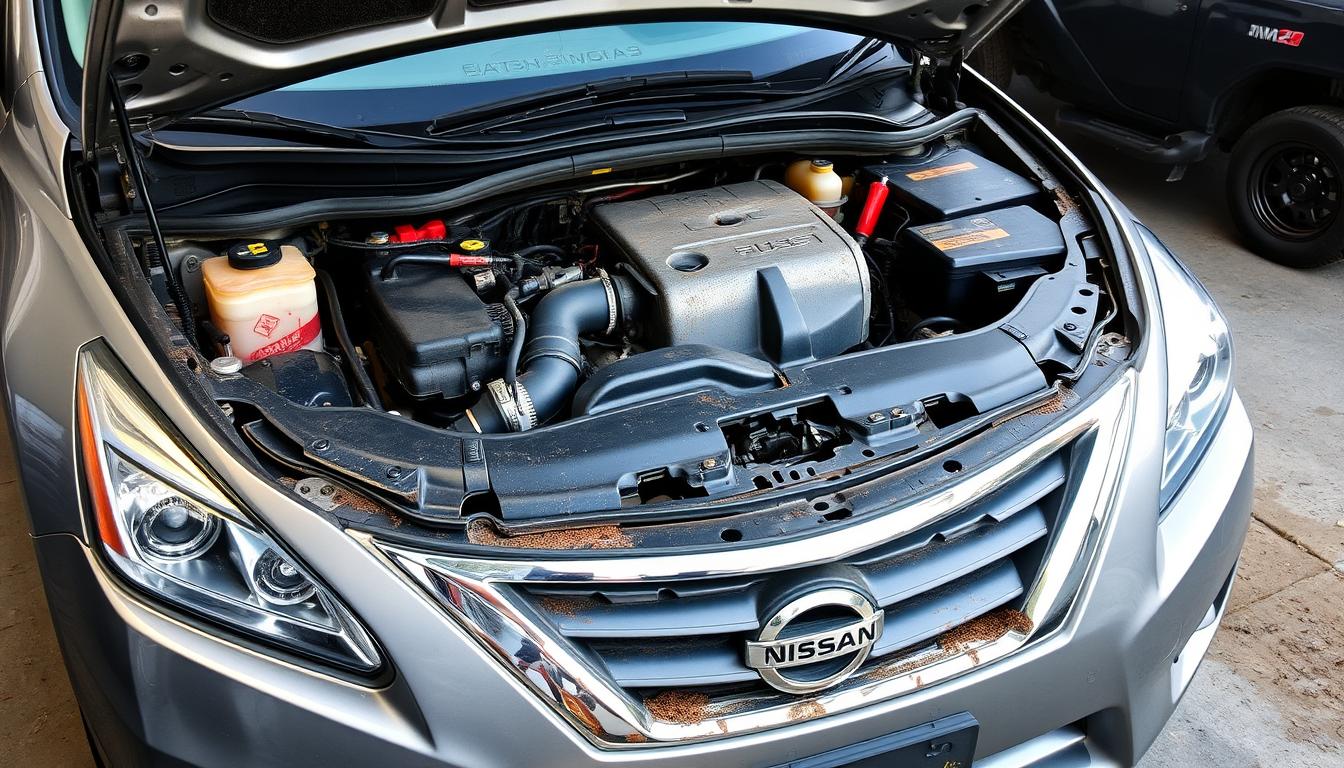The Nissan Altima is known for being dependable and reliable. Yet, like any car, it faces common issues that need fixing. Knowing about these problems is key to keeping your car running well for a long time.
Issues like problems with the camshaft and crankshaft position sensors, intake gasket, fuel pump, catalytic converter, engine seal, and transmission can be expensive. For example, fixing a failing camshaft or crankshaft position sensor can cost between $167 and $215. A leaking intake gasket fix can range from $311 to $387.
Knowing about these common problems can help you spot issues early. This saves you both time and money. In this article, we’ll explore the most common Nissan Altima problems. We’ll talk about their causes, symptoms, and how to fix them, helping you take better care of your car.
Key Takeaways
- Common issues with Nissan Altima include problems with the camshaft and crankshaft position sensors, intake gasket, fuel pump, catalytic converter, engine seal, and transmission.
- Understanding these Nissan Altima problems is crucial for proper maintenance and timely repairs.
- The cost of repairing common issues with Nissan Altima can range from $167 to over $1,200.
- Being aware of potential problems can help you identify issues early on, saving you time and money.
- Regular maintenance is key to preventing common issues with Nissan Altima and ensuring the longevity of your vehicle.
- Stay informed about the most prevalent Nissan Altima problems to make informed decisions about your vehicle’s care.
Understanding Your Nissan Altima’s Vulnerabilities
The Nissan Altima is a favorite among many drivers. But, some models have specific problems. Knowing these can help you fix issues and keep your car in top shape.
Most Affected Model Years
Some years have more issues than others. The 2012, 2015, and 2021 models get the most complaints. These years often deal with transmission and electrical system problems.
Common Problem Categories
When you’re dealing with Nissan Altima issues, it helps to group them. Here are the main areas:
- Engine Issues: Like sudden cruise control stops and false collision alerts.
- Transmission Failures: CVT problems can cause power loss.
- Electrical System Problems: Issues like dim headlights and faulty sensors.
- Suspension Complications: Problems with steering wheel locking and vibrations.
Warning Signs to Watch For
Spotting problems early can save you from bigger issues. Look out for these signs:
- Dashboard lights that won’t turn off.
- Unexpected power loss or weird acceleration.
- Strange noises from the engine or while driving.
- Steering problems like vibrations or locking up.
Transmission Problems in Nissan Altima Models
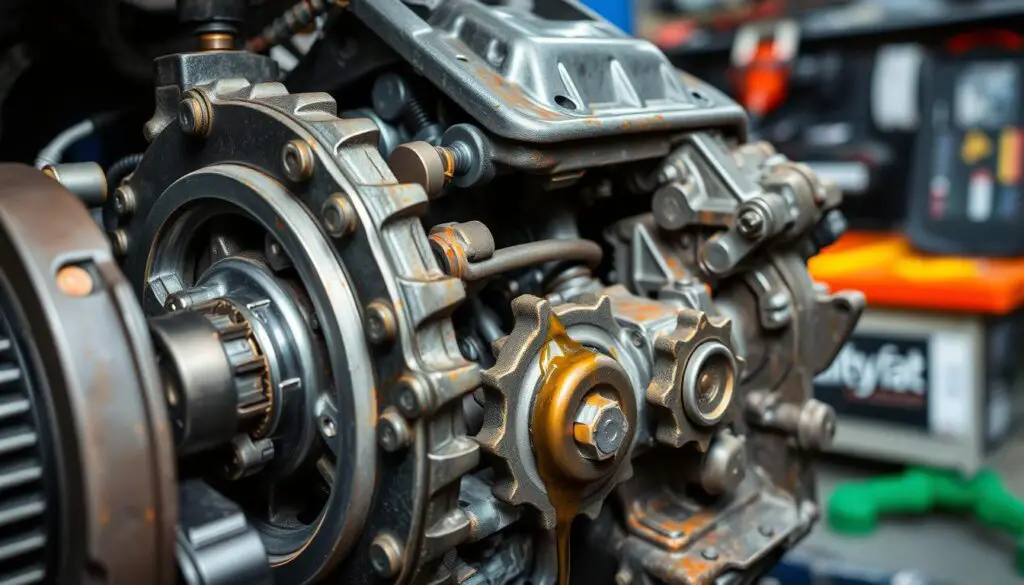
The Nissan Altima has been a favorite among many drivers. But, Nissan Altima recurring problems have caused concern. The main issue is with its continuously variable transmission (CVT), which started in 2007.
A CVT is meant to offer smooth acceleration without the usual gear shifts. It’s supposed to improve fuel efficiency and make the ride smoother. But, many owners have faced big problems that don’t match these promises.
Some common signs of CVT trouble in the Nissan Altima include:
- Delayed throttle responses
- Shaking or jerking during acceleration
- Stuttering or inconsistent power delivery
- Sudden shutdowns while driving
Even with regular maintenance, like changing the transmission fluid, these issues often don’t go away. Some Altima owners have seen their transmissions fail at high mileage, like 157,000 miles.
Nissan has tried to fix these solutions for Nissan Altima issues by offering longer warranties. The extended warranty covers up to 120,000 miles. They’ve also issued recalls, like the 2016 one for 2013-2016 Altima models to fix TCM problems.
Fixing or replacing a CVT transmission can cost a lot, from $3,000 to $5,000. Many owners have sought help from lemon laws. They’ve gotten refunds or new cars after many failed repairs.
| Model Year | Common Transmission Issues | Repair Costs | Warranty Coverage |
|---|---|---|---|
| 2007-2010 | Jerking, slipping, rough shifting | $3,000 – $4,500 | 10 years or 120,000 miles |
| 2013-2016 | Transmission control module defects | Up to $5,000 | Extended warranty applied |
| 2016 | Multiple CVT failures | $5,000 | Lemon law protection |
CVT Transmission Failure: Signs and Solutions
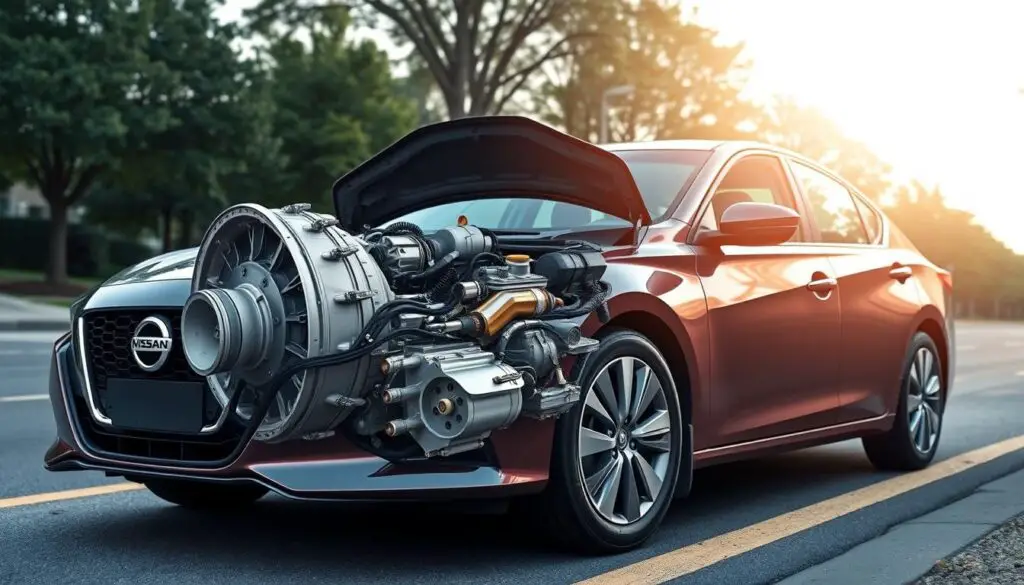
Nissan Altima owners need to watch out for CVT transmission issues. Knowing the known faults of Nissan Altima can help avoid big problems later.
Early Warning Symptoms
Look out for early signs of CVT problems. Sounds like whining or clunking, vibrations, and changes in how the car drives are signs. If the car hesitates when you press the gas or slips gears, get help from a mechanic.
Repair Options
There are several ways to fix CVT issues in your Nissan Altima. Small fixes might include changing the transmission fluid or fixing sensors. For bigger problems, you might need a new transmission. Nissan has made their CVT better over time, making it more reliable and efficient.
Replacement Costs
Fixing Nissan Altima problems can cost a lot, depending on the damage. Repairs usually cost between $3,500 and $8,000. Here’s a table showing what different repairs might cost:
| Repair Type | Estimated Cost |
|---|---|
| Transmission Fluid Replacement | $200 – $400 |
| Sensor Repair | $300 – $700 |
| Transmission Rebuild | $2,500 – $5,000 |
| Full Transmission Replacement | $4,000 – $8,000 |
Knowing these costs helps you decide how to keep your Nissan Altima’s CVT in good shape. This ensures it lasts longer and works better.
Engine Performance Issues and Fixes
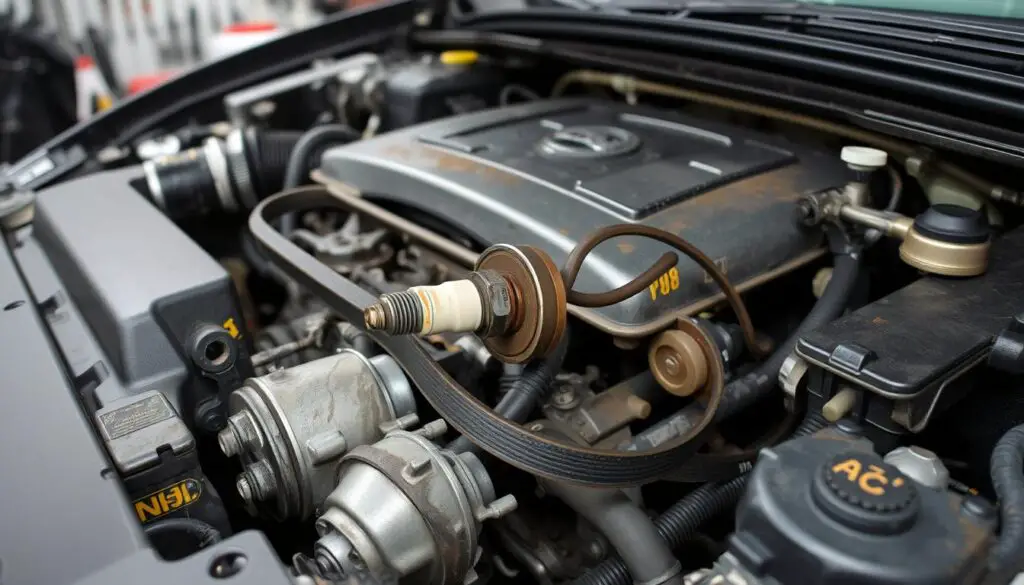
Many owners of the Nissan Altima face problems with the camshaft and crankshaft position sensors. These sensors are key for the engine’s timing and performance. If they fail, the car might not start or stall while driving.
Other common issues include oil leaks and failures of the catalytic converter. Oil leaks can cause engine wear due to less lubrication. A failing catalytic converter hurts fuel efficiency and increases harmful emissions.
When troubleshooting Nissan Altima problems, OBD-II scanners are useful. They help find specific error codes for engine issues. Regular maintenance, like oil changes and inspections, helps prevent these problems.
Look out for signs like rough idling, poor acceleration, and sudden power loss. If you see these, get help from a certified mechanic. Goodhood Mobile Auto Repair Services in Collin County, Texas, is a great place to start. They offer expert diagnosis and repairs to keep your car running well.
Common Electrical System Problems
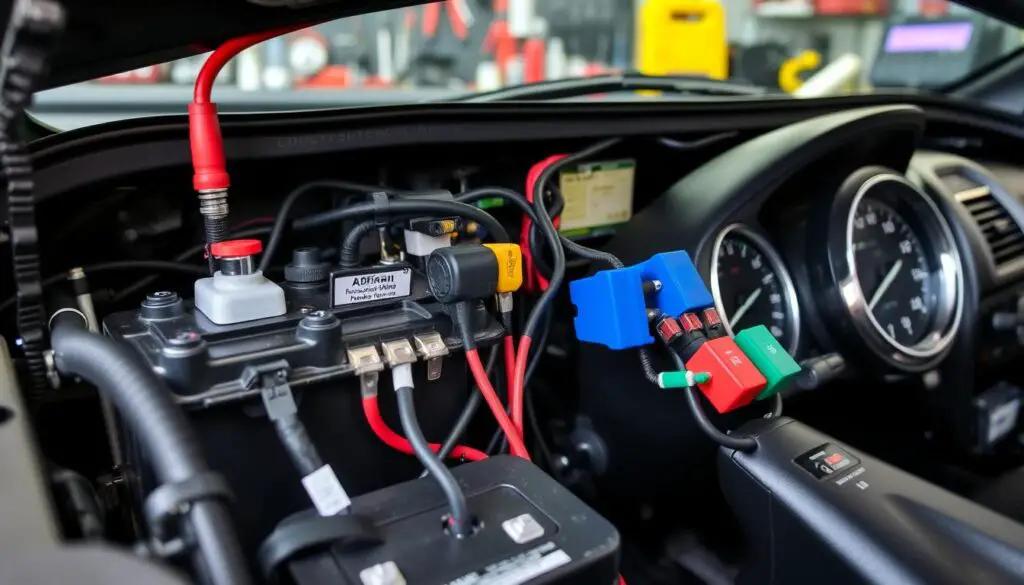
The electrical system in your Nissan Altima is key for many functions. It helps start the engine and run your car’s electronics. Knowing common issues with Nissan Altima can help you fix them fast.
Battery Drainage Issues
A failing battery can quickly drain, leaving you stuck. Most Altima batteries last three to four years. Corroded cables might cause clicking sounds or not work right.
Regular checks can stop unexpected failures.
Starter Problems
If your Altima has trouble starting or makes odd noises, the starter might be the problem. Finding starter issues early can avoid expensive fixes. An inspection usually costs about $95 for labor.
Electrical Component Failures
Other electrical problems include faulty sensors, dashboard warning lights, and broken door locks. Issues like backup camera problems or infotainment system crashes can mess up your drive. Using On-Board Diagnostics (OBD) can help in diagnosing Nissan Altima concerns well.
Suspension and Steering Complications
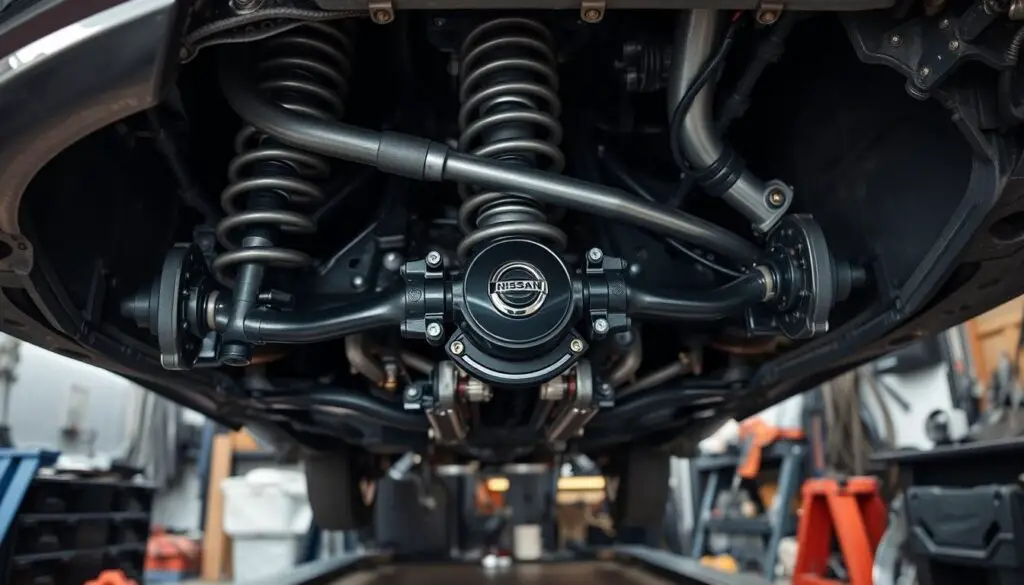
Nissan Altima problems with suspension and steering can make driving unsafe and uncomfortable. Many owners have noticed their steering wheels feeling loose or experiencing sudden lock-ups. These issues often stem from faulty tie rods, key parts of the steering system.
In March 2021, Nissan recalled tie rods for some Altima models. This was to address concerns about steering failures. Spotting these problems early is key to fixing them right.
Common signs include:
- Loose or wandering steering wheel
- Unusual vibrations at high speeds
- Sudden steering lock-ups
Knowing about Nissan Altima problems helps you act fast. If you notice any of these signs, get professional help right away. Fixing the steering might mean replacing tie rods or other parts. Getting repairs from skilled mechanics is vital to avoid more issues and keep your car safe.
Here’s a table with common suspension and steering issues in Nissan Altima and how to fix them:
| Issue | Signs | Solution |
|---|---|---|
| Loose Steering | Steering wheel wanders | Replace faulty tie rods |
| Vibrations | Shaking at high speeds | Balance wheels, check suspension components |
| Steering Lock-up | Sudden resistance in steering | Inspect and repair steering system |
Interior Electronics and Dashboard Malfunctions
Dealing with interior electronics issues can be frustrating for Nissan Altima owners. These problems often disrupt daily driving and require timely solutions for Nissan Altima issues.
Display Screen Issues
Display screens may become unresponsive or flicker due to software glitches or hardware faults. Restarting the system or updating the firmware can often resolve these issues.
Climate Control Problems
Inconsistent temperature regulation or malfunctioning fans are common climate control problems. Checking the thermostat and ensuring the HVAC system is free from obstructions are effective troubleshooting Nissan Altima problems.
Entertainment System Glitches
Entertainment systems may face Bluetooth connectivity issues or audio failures. Resetting the system or updating the software provides solutions for Nissan Altima issues related to entertainment features.
| Warning Light | Meaning | Recommended Action |
|---|---|---|
| Brake Warning Light | Issues with the braking system | Immediate inspection by a professional mechanic |
| Engine Oil Pressure | Low oil pressure | Check oil levels and top up or replace oil |
| ABS Warning Light | Problems with anti-lock braking | Promptly consult a service center |
| Check Engine Light | Engine or emissions issues | Use an OBD-II scanner to diagnose the issue |
| Low Tire Pressure | Under-inflated tires | Inflate tires to the recommended pressure |
Brake System Issues and Safety Concerns
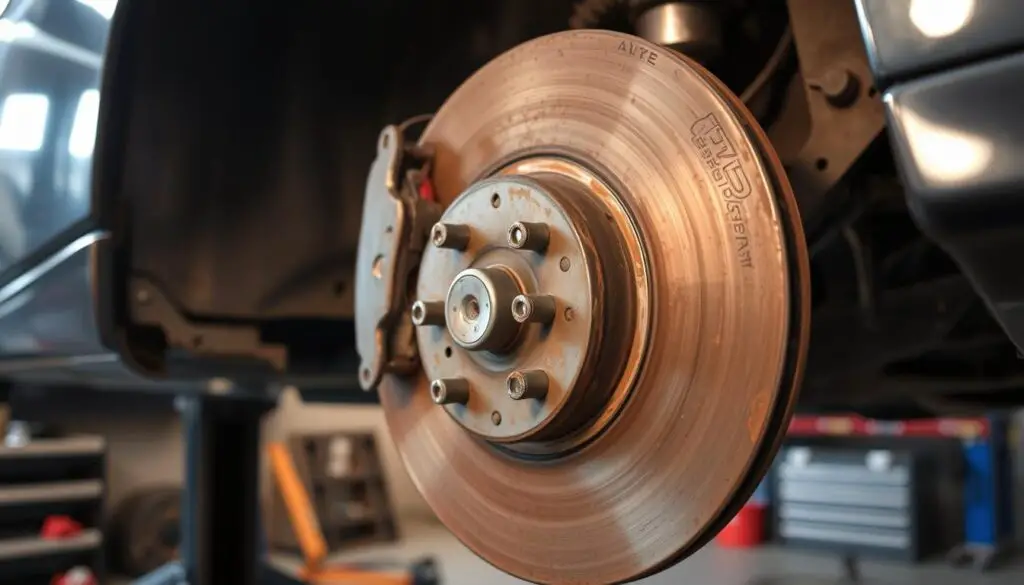
The Nissan Altima is known for being reliable. Yet, it has some known faults of Nissan Altima that owners should know. The brake system is a big concern for safety.
Common brake problems in the Nissan Altima include:
- Premature brake pad wear
- Squealing or grinding noises during braking
- Reduced braking performance
- Vibrating or pulsating brake pedal
- Pulling to one side when braking
Advanced safety features like the forward collision avoidance system (FCW) and automatic emergency braking (AEB) have also shown Nissan Altima problems. Over 1,500 complaints have been filed about AEB malfunctions, causing crashes and injuries. Lawsuits, like Brashaw v Nissan North America, Inc., highlight these serious safety issues.
Regular maintenance is key to avoiding brake problems. It’s advised to:
- Replace brake pads when they wear down to less than a quarter inch
- Change brake fluid every two years
- Have regular professional brake inspections
Ignoring these signs can put your safety at risk. If you notice any brake issues, get a qualified technician to fix the known faults of Nissan Altima quickly.
Air Conditioning and Heating Problems
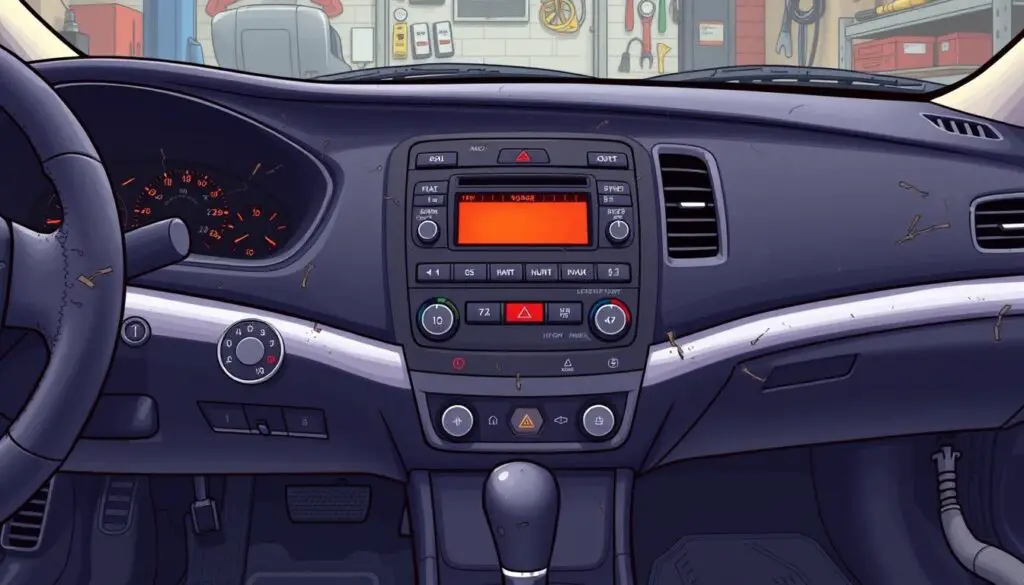
Nissan Altima owners often face common issues with Nissan Altima related to the HVAC system. These problems are more common in extreme temperatures. Fixing these issues quickly can make your car more comfortable and last longer.
Common AC Failures
Problems with the Nissan Altima’s air conditioning include refrigerant leaks, compressor malfunctions, and electrical faults. These issues often show up in cold weather, starting in January 2007 and happening again in later winters.
Heating System Issues
Heating problems in the Nissan Altima might involve faulty heater cores or blower motors. Airflow issues usually happen on highways in cold weather but go away when it gets warmer. Tests show that the heater core works fine when it’s not too cold.
Maintenance Tips
- Regularly check refrigerant levels to prevent leaks.
- Inspect and replace compressor components as needed.
- Ensure blower motors and resistor packs are functioning correctly.
- Monitor electrical connections to avoid faults.
Understanding the electrical behavior of the Thermo Control Amplifier can help fix Nissan Altima problems. Here are the voltage readings under different conditions:
| Condition | Voltage Reading |
|---|---|
| AC button not pressed | 12.92 VAC |
| AC button pressed and compressor on | 152 mVAC |
| AC button pressed but compressor off | 4.76 V |
Forum discussions point to the Thermo Control Amplifier as a possible cause, mainly in second-generation Nissan Altima models. Regular maintenance and quick inspections can stop small problems from becoming big repairs.
Fuel System and Economy Concerns
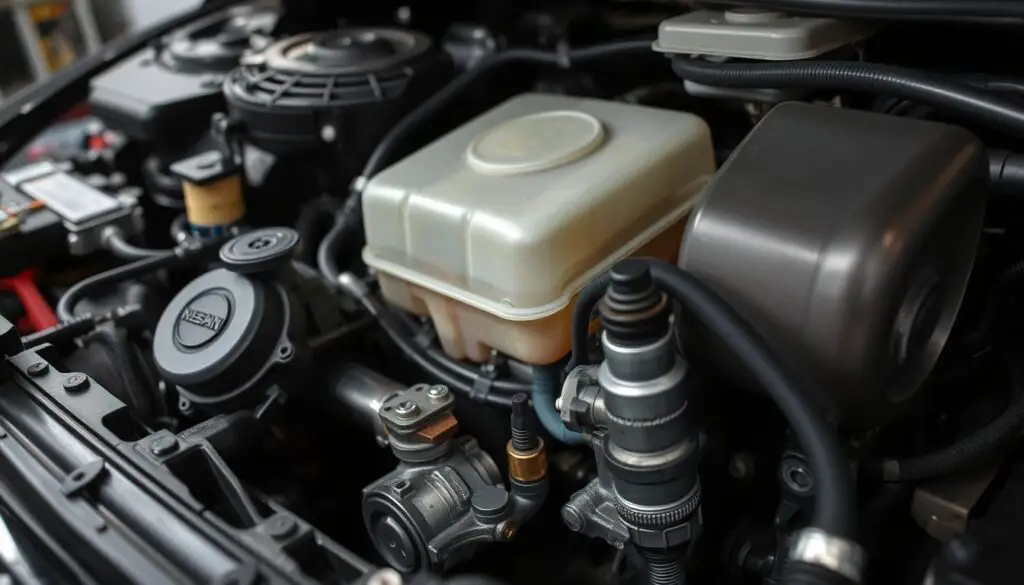
The fuel system is key for your Nissan Altima’s performance and fuel use. Many drivers face Nissan Altima problems with the fuel pump. This can cause the engine to stall or make starting hard.
Problems with the fuel pump can lead to bad gas mileage. The engine might not get enough fuel. You might hear strange noises like whining or buzzing near the gas tank. This means the fuel pump is not working right.
Other parts, like fuel injectors and the fuel pressure regulator, also affect troubleshooting Nissan Altima problems. Dirty fuel injectors or a bad pressure regulator can lower fuel efficiency and performance.
To find these issues, test the fuel pressure and watch the fuel pump relay. Checking for bad gas mileage costs about $95 for labor. Simple fixes, like replacing the fuel pump relay, might solve the problem. If not, you might need to replace the fuel pump for smooth running.
| Issue | Symptoms | Potential Causes | Solutions |
|---|---|---|---|
| Fuel Pump Failure | Engine stalling, difficulty starting | Worn pump, electrical issues | Replace fuel pump or relay |
| Dirty Fuel Injectors | Poor gas mileage, rough engine | Clogged injectors | Clean or replace injectors |
| Faulty Fuel Pressure Regulator | Inconsistent fuel delivery, reduced efficiency | Wear and tear | Replace regulator |
Essential Maintenance Tips to Prevent Problems
Regular maintenance is vital to fixing Nissan Altima problems early. A consistent service schedule keeps your car running well and makes it last longer.
Regular Service Schedule
Following Nissan’s service schedule is important. For example, oil changes are needed every 5,000 to 7,500 miles. Also, tire rotations should happen every 6,000 to 8,000 miles to ensure even wear.
Preventive Measures
Preventive steps can greatly lower the chance of solutions for Nissan Altima issues. Always check fluid levels, inspect belts and hoses, and replace air filters every 15,000 miles. These actions can stop unexpected breakdowns.
DIY Maintenance Guidelines
Many maintenance tasks can be done at home, saving you time and money. Simple tasks like checking tire pressure monthly, replacing air filters, and changing fluids are easy. These steps help in fixing Nissan Altima problems and improve your car’s reliability.
| Maintenance Task | Recommended Interval |
|---|---|
| Engine Oil Change | Every 5,000 to 7,500 miles |
| Tire Rotation | Every 6,000 to 8,000 miles |
| Air Filter Replacement | Every 15,000 miles |
| Brake Inspection | Annually |
| Battery Check | Every 12 months |
Cost Analysis of Common Repairs
Knowing about Nissan Altima problems helps owners plan their budget for repairs. The cost of fixing known faults of Nissan Altima can vary a lot.
Small fixes, like replacing sensors, usually cost about $167. But bigger problems, like replacing the catalytic converter or fuel pump, can cost over $1,000.
Several things affect these costs:
- Vehicle Age: Older cars might need more repairs.
- Location: Prices can differ by state, with California being the highest.
- Repair Shop Choice: Dealerships often charge more than independent mechanics.
| Repair Type | Average Cost |
|---|---|
| Sensor Replacement | $167 |
| Brake Pad Replacement | $300 |
| Catalytic Converter | $1,200 |
| Fuel Pump | $900 |
| CVT Transmission Repair | $2,500 |
By thinking about these factors and knowing the known faults of Nissan Altima, owners can plan their repair budget. They can also decide if it’s better to keep their car or look for other options.
When to Seek Professional Help vs. DIY Solutions
Choosing whether to fix Nissan Altima problems yourself or get help can save you money and time. Knowing what the problem is helps you make the best choice.
Professional Repair Indicators
- Persistent check engine light
- Complex electrical system failures
- Major component issues like transmission or engine problems
- Unusual noises that are hard to diagnose
- Recalls affecting your vehicle model
Safe DIY Fixes
- Replacing air filters every 18,000 miles
- Changing windshield wipers
- Checking and topping up fluid levels
- Replacing light bulbs
- Changing oil every 20,000 miles or 24 months
Finding Qualified Mechanics
If you need professional help, finding a good mechanic is crucial. Look for certified techs who know Nissan cars well. Check out local shops, read reviews, and check their certifications for top service.
| Issue Type | DIY Fix | Professional Repair |
|---|---|---|
| Air Filter Replacement | Yes | — |
| Check Engine Light | No | Recommended |
| Windshield Wiper Change | Yes | — |
| Transmission Issues | No | Essential |
| Oil Change | Yes | — |
Warranty Coverage and Extended Protection Options
Knowing about warranty coverage is key to handling Nissan Altima problems well. Nissan’s standard auto warranty covers your car for 3 years or 36,000 miles, whichever is first. This warranty protects against many common issues, giving Altima owners peace of mind.
Nissan also offers extended warranty options through the Nissan Security+Plus Extended Protection Plans. These plans provide extra protection beyond the standard warranty, covering up to 8 years or 120,000 miles after the factory warranty ends.
- Gold Preferred: Covers over 2,200 components, including critical systems like the engine and transmission.
- Silver Preferred: Protects over 1,500 components, offering a balanced coverage option.
- Powertrain Preferred: Focuses on essential parts with coverage for over 840 components.
For model years 2007 to 2010, Nissan extended its powertrain warranty. This change helps with CVT transmission issues, covering up to 10 years or 120,000 miles. This is great for owners facing transmission problems with their Altima.
To make a warranty claim, contact your authorized Nissan dealer and provide the needed documents. If your Altima has issues after the warranty expires, third-party extended warranties can help. Think about the pros and cons of each plan to choose the best for your car.
Alternative Solutions for Recurring Issues
Dealing with Nissan Altima recurring problems often needs more than just repairs. Looking into other solutions can make your car run better and last longer.
One good way is to add aftermarket parts. For instance, a better cooling system can help with CVT transmission heat. This can prevent overheating and failure. Also, using top-notch sensors can make the electrical system work better, fixing common issues.
- Enhanced cooling systems for CVT transmissions
- Higher-quality sensors for improved electrical performance
- Additional sound insulation to minimize cabin noise
These changes can make your car last longer and drive smoother. But, they might void your warranty and affect the car’s value. It’s important to think about these points before making a decision.
At times, these solutions for Nissan Altima issues could save you money over frequent repairs. Yet, if problems keep coming back, it might be time to look at a new car or a different brand.
Conclusion: Making Informed Decisions About Your Nissan Altima’s Care
Knowing about common Nissan Altima issues is crucial for its performance and life span. Problems like transmission and electrical system issues can be fixed early if you’re aware. Regular maintenance is key to avoiding big repairs and keeping your car reliable.
Keeping up with service schedules and watching for warning signs can help a lot. This simple approach can make a big difference.
Studies show a well-kept Nissan Altima can last up to 300,000 miles. This shows how important it is to take care of it. By doing regular maintenance and getting professional help when needed, you can make your Altima last longer and save money.
Thinking about long-term costs and reliability helps you make smart choices about repairs or replacing your car. This way, you can keep your Altima running well for years.
Being proactive with your Nissan Altima’s care boosts its performance and value. Whether you fix small issues yourself or get help for bigger ones, knowing what to do helps. Follow these tips to keep your Altima a reliable friend for many miles ahead.
FAQ
What are the most common Nissan Altima problems?
Which Nissan Altima model years are most affected by transmission problems?
How can I troubleshoot CVT transmission issues in my Nissan Altima?
What engine performance issues should I be aware of in my Nissan Altima?
How do I identify and fix electrical system problems in my Nissan Altima?
What suspension and steering complications are common in Nissan Altimas?
How can I resolve interior electronics and dashboard malfunctions in my Nissan Altima?
What brake system issues should Nissan Altima drivers be aware of?
How do I address air conditioning and heating problems in my Nissan Altima?
What fuel system and economy concerns exist for Nissan Altima owners?
What essential maintenance tips can help prevent common Nissan Altima problems?
When should I seek professional help versus attempting DIY solutions for my Nissan Altima?
What warranty coverage is available for Nissan Altima issues?

Jack Thompson is a writer and seasoned auto mechanic with over 15 years of experience in the automotive industry. Known for his expertise in vehicle mechanics, Jack has a deep understanding of car and truck systems. His skills, honed through years of hands-on experience, have made him a trusted name in the field. Jack is committed to providing valuable insights into car maintenance and repair, helping vehicle owners keep their vehicles in top condition.

